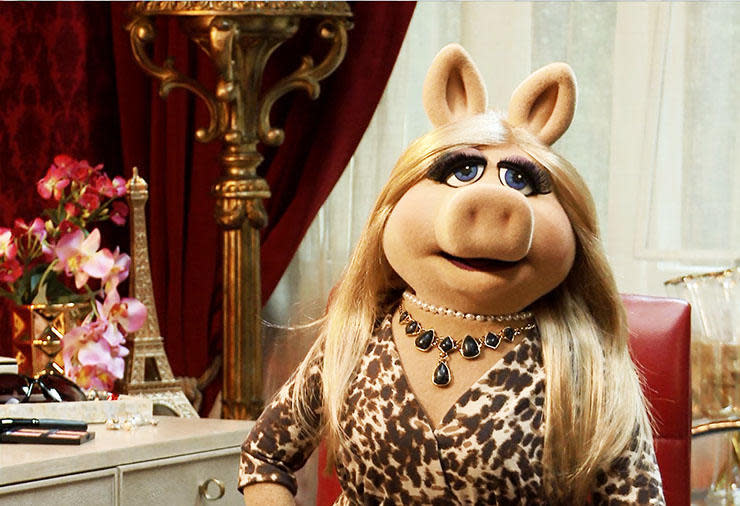Why Isn't 'The Muppets' More Successful?

Going into the new fall season, The Muppets looked like one of the few sure hits. ABC’s rebooting of The Muppet Show, beloved by generations after a 1976-81 run, sounded like an appeal to nostalgia capable of picking up new young fans as well. The production got a lot of pre-premiere coverage targeting the cutesiest aspect of its roots, with media outlets eager to play along with the publicity-stunt joke that Kermit and Piggy had broken up and would pursue other creatures.
It hasn’t worked out as well as its creators and the network doubtless wish it had. The Muppets ratings have slid each week since its Sept. 22 premiere, and there’s no buzz about the show. What happened? I think a number of factors are responsible.
One is the show’s new premise. The creators of the new Muppet enterprise, Bill Prady and Bob Kushnell, took the characters created by Jim Henson and gave them a modern twist, setting Kermit, Piggy, Fozzie, and the rest of the Muppet character universe in a behind-the-scenes look at a talk show, Up Late with Miss Piggy. There are two potential problems right there: The first is that prime-time audiences aren’t all that interested in late-night TV shows. The rare exceptions include Garry Shandling’s The Larry Sanders Show, but more often, sitcoms starring humans placed in the Muppet’s current context — from Dabney Coleman’s marvelous one-season-wonder Buffalo Bill (1983-84) to Bonnie Hunt’s frequently very funny Life With Bonnie (2002-2004) — were, more or less, bombs. The second problem is that by making Piggy the star of the show-within-the-show, it sent out indications to viewers that other characters would be sidelined, mere supporting players.
As someone who’s never been smitten by Piggy’s charms — her fluff-headed vanity always seemed more irritating and pathetic than funny — I thought right from the start of the new show that this was an outmoded feminine image that wasn’t going to fly with a big chunk of the audience, despite the efforts behind the real Muppet scenes of solid talent such as the excellent writer Nell Scovell.
Does it sound like I’m taking The Muppet Show too seriously in this analysis? Well, tell that to ABC, which had a very serious investment in making The Muppet Show the latest prize in its resurgence as a sitcom home, following the recent successes of Black-ish and Fresh Off The Boat. Like those shows, Muppet was supposed to be both a mass-audience crowd-pleaser and a clever production that would inspire a lot of media think-pieces about both the enduring appeal of the Muppets and the ways in which familiar characters can carry forward 21st-century ideas about what the media likes to write about most: media — in this case, post-modern cleverness about behind-the-scenes showbiz.
At this point I doubt there’s much of a way The Muppets can be boosted into a hit. It’s not as though the show can do what other, human-led series do as repair-work — recasting, or refocusing the show on supporting characters the audience seems to like more, or shifting the emphasis away from the talk show setting to, say, the domestic lives of the principals. Nope, ABC is stuck with what they bought: The Muppets. Unlike my beloved Statler and Waldorf, I take no pleasure in The Muppets’ failure to take off, but I also can’t say I’m surprised.
The Muppets airs Tuesdays at 8 p.m. on ABC.


